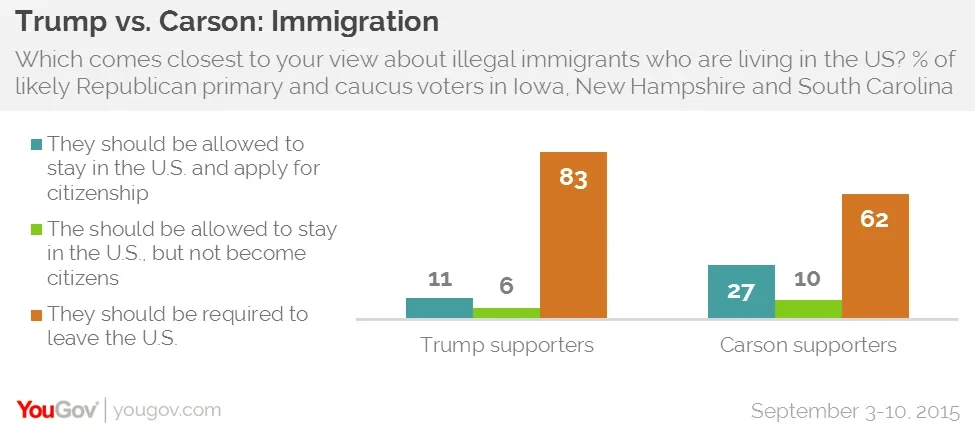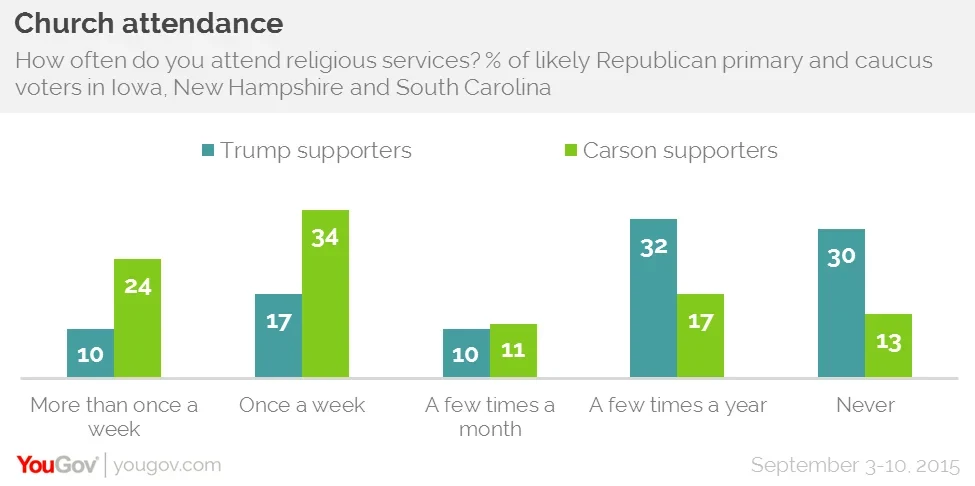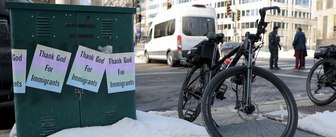Trump supporters are strongly anti-immigration, but many defy Republican orthodoxy in other areas
Politics makes strange bedfellows and none more than Donald Trump and Ben Carson, who are currently topping the polls in the race for the 2016 Republican Presidential nomination. They share little in common except for having improbable biographies for a Republican Presidential candidate. A few months ago they would have both been considered fringe candidates, but together they are now the preferred nominee for a majority of Republican primary voters. One might say that they are similar in their dissimilarities.
While it is natural to think of Trump and Carson in the same terms, their supporters are quite different. Some data from the just-completed first wave of the CBS News/YouGov 2016 Battleground Tracker makes this clear. We polled over 500 likely Republican primary voters in each of the key early states (Iowa, New Hampshire, and South Carolina). If it turns out to be a Trump-Carson race (mind you, a big “if”), it is hard to see how one could win over the other’s supporters.
Trump supporters are on the far right of the immigration debate.
Yes, what candidate Trump says about immigration does seem to resonate with his supporters, with about four out of five in favor of deporting all illegal immigrants. The only other candidate whose supporters are as far in this direction on immigration is Ted Cruz. On the other hand, Carson supporters are (depending on the state) 15% to 21% less likely to favor deportation. This doesn’t make them supporters of immigration reform, but roughly a third would allow some illegal immigrants to stay in America under certain conditions.

On issues other than immigration, Trump supporters are not extreme relative to the Republican base.
Overall, Trump supporters are slightly to the left of most Republicans. 84% of Iowa Republican primary voters call themselves conservative compared to 78% of Trump supporters in Iowa. In New Hampshire, 55% of Republican primary voters are conservative, compared to 54% of Trump supporters. In South Carolina, 69% of Republicans are conservative, compared to 64% of Trump supporters. Again, it’s all relative. Trump supporters are conservative, but not quite as conservative as the average Republican primary voter. Carson supporters, in contrast, are quite a bit more conservative, with 91% in Iowa, 84% in New Hampshire, and 77% in South Carolina calling themselves conservatives.
On economic issues, Trump supporters don’t sound very conservative.
In fact, they are downright populist. Republicans, as a whole, are big fans of the American free enterprise system. Donald Trump’s supporters, not so much. Consider the minimum wage. Raising the minimum wage is very popular with Democrats and Independents, but opposed by most Republican primary voters (82% in Iowa, 63% in New Hampshire, and 70% in South Carolina). It’s nearly impossible to find a Carson supporter who favors increasing the minimum wage (3% to 9%). Trump himself said that “a low minimum wage is not a bad thing for this country.” While a majority of Trump supporters agree, a sizeable (13% to 25%) minority support an increase in the minimum wage. They are at opposite ends of the Republican spectrum on this issue.
Trump is definitely not the candidate of the religious right.
Most Carson supporters say they attend religious services once or more per week (68% in Iowa, 59% in South Carolina, but only 36% in secular New Hampshire), while most Trump supporters admit that they never attend religious services or only a few times a year (56% to 73% in these three states). Despite the stereotype of the Republican base as being religious zealots, Trump supporters actually more typical than Carson supporters: 39% to 70% never or rarely attend religious services.

Trump supporters are about 15% more likely to favor legal abortion in all or most cases than Carson’s supporters. The same pattern holds for gay marriage and the legalization of marijuana. They are still pro-life, anti-gay-marriage, and opposed to legalizing drugs, but less uniformly so than Carson supporters. Carson, if not born again, has been baptized twice, while Trump has been married thrice. 67% of Carson supporters in Iowa are born again, 31% in New Hampshire, and 69% in South Carolina. The comparable percentages among Trump supporters are 42%, 19% and 62%. (For Republicans overall, the percentages are 52%, 21% and 64%, so Trump supporters are closer to the Republican average than Carson supporters.)
Trump attracts support from the right-most anti-immigration flank of the Republican party as well as its more socially moderate wing. Carson seems to be current choice of its conventionally conservative and religious base. What will happen if one of the candidates starts to fade? About a third of Trump’s supporters in each of the three states says that Carson is their second choice–more than for any other candidate. In Iowa and New Hampshire, Carson supporters are more likely to name Carly Fiorina than Trump as their second choice (though 30% of Carson’s South Carolina supporters say Trump is their second choice). This makes Trump vulnerable to a Carson surge, while it seems likely that Fiorina or another candidate would emerge if Carson falters.
In 2012, the Republican nomination campaign was briefly diverted by Herman Cain, Michelle Bachmann, Newt Gingrich, and Rick Santorum, before settling on a more conventional nominee. This year is different. Trump has already lasted longer than any of the 2012 flashes-in-the-pan and the second place candidate now is Ben Carson, not Mitt Romney. Dangerous curves ahead.
See here for the full results of the YouGov/CBS News 2016 Battleground Tracker.








